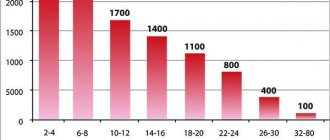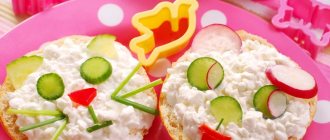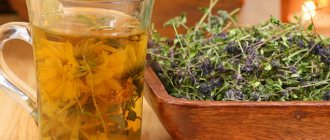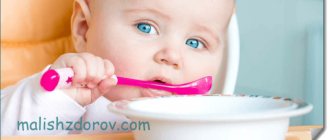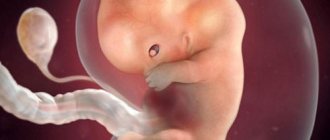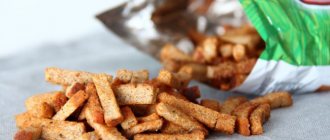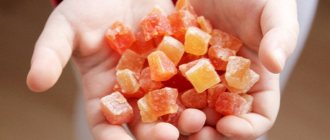After childbirth, a nursing mother's diet should consist only of properly selected dishes. Every woman should know what a nursing mother can eat in the first month after giving birth. The life and health of the child will depend on what a breastfeeding mother eats. When choosing a menu for a nursing mother in the first month after giving birth, one should not rely on luck. At this time, the newborn’s digestive system is most susceptible to external factors.
Every mother, when breastfeeding her child, must strictly control her diet and carefully select products for creating a menu. On the first day, doctors recommend that the mother give her body a little relief and drink only clean, still water. This will help restore the amount of water that was lost during childbirth.
If you really want to eat, then you need to replace your usual meal with low-fat dairy products, including yogurt or kefir without additives. In the first week, lactation itself largely depends on the nutrition of the nursing mother. This is the period when it is just being established, starting milk production. It is best to follow the principles of proper nutrition for a nursing mother until the very end of breastfeeding.
What foods should you avoid?
The nutrition of a nursing mother in the first month should consist only of healthy foods, so that the food does not harm the baby after feeding.
An approximate list of foods that should be excluded from a nursing mother’s diet in the first month after childbirth includes:
- sweets, especially chocolate;
- nuts;
- all types of brightly colored fruits, as well as vegetables and berries (cherries, strawberries, grapes);
- almost all types of sauces, especially hot ones;
- too hot or spicy food;
- shrimps;
- chicken eggs in large quantities. You should also not eat eggs raw or half-raw because of the risk of salmonellosis;
- smoked sausages and sausages;
- soda, kvass;
- any products that include additives in the form of dyes, flavor enhancers and thickeners;
- strong tea, cocoa or coffee. The last drink should be excluded for the entire feeding period;
- fast food and chips;
- pearl barley, lentils, white cabbage, any types of legumes and mushrooms. All these products contribute to increased gas formation, which can cause colic;
- melons;
- canned foods;
- honey;
- rich meat broths;
- red fish;
- confectionery and flour products;
- pasta;
- garlic and raw onion. They contribute to a change in the taste of milk, which may cause the baby to refuse to eat;
- fatty meat, fish and other seafood;
- beet;
- any drink with a high content of preservatives.
- exotic types of fruits;
- turnip;
- bell pepper
There is a lot of debate about what a breastfeeding mother can eat in the first month after giving birth due to the unique characteristics of each baby. Even twins can have different reactions to the same foods. The mother must monitor her diet herself and adjust the list depending on the reaction of the baby’s body.
You also need to be careful when consuming whole milk. It can improve the mother's condition or bring a completely different effect. It is recommended to replace whole milk with other fermented milk products (kefir, fermented baked milk, yogurt) without additives.
Any new food must be introduced very carefully. Doctors recommend trying only one new product per day. This will help to accurately identify what exactly the child’s body cannot yet fully absorb.
List of low-allergenic foods for nursing mothers
In order to find out what foods a nursing mother can and cannot eat, you need to understand that the nutrition of a nursing mother consists of three important principles:
- safety;
- diversity;
- correct drinking regime.
Safety
The daily diet should not contain foods containing dyes, preservatives, or harmful compounds . In addition, it is unsafe to consume tobacco products, alcohol, coffee, and strong tea.
Potentially dangerous and even prohibited foods for a nursing mother include radishes, cabbage, melons, broccoli, brown bread, garlic, and cucumbers, as they can cause severe painful colic in a newborn. However, the list of such products can be expanded or narrowed independently, depending on the individual reactions of the child.
Do you know what sedative you can use while breastfeeding? How to do without medications is in our article.
Find out how to properly massage the breasts of a nursing mother here. Provide timely help to your breasts.
Correct drinking regime
A woman feeding her baby with breast milk should drink at least one and a half liters of clean still water per day.
The rest of the drink consists of weakly brewed teas, juices, fruit drinks, and jelly.
Diversity
It is a mistake to believe that a young mother’s diet is poor. With its proper organization, you can receive not only all the useful substances, but also taste pleasure.
The mother herself should not limit herself in taking permitted food, wanting to get rid of excess body weight. The very nature of nutrition will help you get back to your previous shape without compromising the health of the baby.
Mom's nutrition: the first weeks
Breakfast and dinner for a woman who has given birth can consist of healthy, tasty, nutritious foods. In the first weeks of the baby’s life, it is recommended to follow a strict diet, during which the woman should eat only natural food, it is better if she prepares it herself. Properly selected nutrition will help not only prevent the occurrence of unwanted reactions such as allergies or colic, but also lose weight.
During the first week, a woman’s nutrition is extremely limited. Doctors recommend eating more cereals prepared with milk or water (buckwheat, corn, oatmeal), fermented milk products, vegetarian soups and plain water.
Starting from the second week, a woman can eat with caution baked or raw green apples without peel (it is better to grate them), prunes, seaweed and boiled eggs in small quantities (to check the reaction, you need to eat the yolk and white separately on different days).
It is worth considering that the first weeks are the time when a woman should eat up to 2.5 thousand calories a day, adhering to a strict diet, due to the high energy costs of producing milk and restoring the body after childbirth.
Healthy foods for nutrition
Simple recipes for every day for nursing mothers consist of tasty and healthy products that saturate the body of mother and child with useful minerals and vitamins.
The main approved foods for mothers during breastfeeding:
- Pike perch, carp, cod and other types of lean fish.
- Lean meats - rabbit, beef, veal.
- Poultry – turkey, quail, chicken.
- Fruits and vegetables - boiled, baked or stewed.
- Porridge – rice, buckwheat, millet, corn grits, oatmeal.
- Milk and dairy products.
- Vegetable and butter fat – no more than 20-25 g per day.
- Prunes, dried apricots and other dried fruits.
When choosing bread during breastfeeding, it is best to give preference to baked goods with bran and rye flour. From confectionery products, a nursing mother is allowed marshmallows and marshmallows.
Video
What can nursing mothers eat from 0 to 3 months?
Gradually, as the child grows, a woman will be able to significantly diversify her diet.
After 10 days, you have the opportunity to choose from a wider list of products, which includes:
- cereals – buckwheat, oatmeal, corn. It is best to devote a separate day to each type of cereal so that you can monitor the reaction of the baby’s body. The first portion of cereal should be equal to 1 tablespoon, a little later you can eat 100-150 grams;
- fish – preference should be given to low-fat sea or river fish, including pollock, pike perch, cod, sea bass, carp, bream, river perch, pike or burbot. They contain the least number of allergens and are best absorbed. It is worth considering that the body’s reaction may depend on the method of preparing the fish. To obtain all the beneficial substances, it needs to be cooked for about 15 minutes;
- meat – you need to choose lean or dietary meat, for example, rabbit, turkey, chicken. Eating beef or pork is allowed;
- vegetables - cabbage (cauliflower only), potatoes, zucchini, broccoli. Carrots are recommended to be consumed in small quantities;
- fruits - at first it is best to give preference to bananas and green baked apples, avoiding other types of fruit. This is due to the fact that the baby’s digestive system is not yet able to fully perceive all types of seasonal fruits normally.
- dairy and fermented milk products – low-fat kefir, sour cream, cottage cheese, cheeses, yogurts that do not contain artificial flavors and additives;
- flour - bread made from bran, wheat. Rye bread is allowed in small quantities.
In order not to mix different dishes, it is best to create a table with which you can diversify your menu and reduce the risk of negative reactions.
What should nursing mothers not eat?
While breastfeeding, mothers need to remember that the baby's digestive system is not perfect.
A woman’s wrong approach to her diet will lead to serious problems for both the newborn and herself. Together with breast milk, substances enter the baby’s body that provoke a severe allergic reaction, bloating, and diarrhea in the baby. It is unlikely that such a prospect will please the young mother. Therefore, some foods, despite their benefits, should be excluded from the diet for a while. At least until the child is six months old.
For allergies in infants
The list of foods that a nursing mother should not eat includes foods that cause an allergic reaction in the baby:
- All citrus fruits cause a very strong reaction in infants. Keep oranges and lemons, as well as all overseas exotics, out of sight.
- Seafood contains very strong allergens; it is better to avoid eating them for a while.
- Vegetables, berries and red fruits (tomatoes, strawberries) contain a carotenoid pigment, which can cause redness, peeling, and itching of the baby's skin.
- Hot, bitter, aromatic seasonings and spices can trigger allergies. A child may also refuse to breastfeed, as they give the milk a specific taste.
- Chocolate, despite its beneficial properties, is quite allergic, so it is advisable to avoid it for a while. Read who and when you can gradually introduce chocolate during lactation.
Detailed article about a hypoallergenic diet for breastfeeding.
For gas and colic
If the baby suffers from increased gas formation and colic, foods that cause fermentation in the intestines should not be eaten during breastfeeding. These products include:
- Fresh, pickled, canned vegetables and fruits. They must be boiled or baked before use.
- Pastries, cakes and any confectionery products. Yeast and sugar provoke severe flatulence in the baby. Therefore, you should not get carried away with baking and sweets.
- All legumes (peas, beans, etc.) also cause severe bloating, so they should not be eaten while breastfeeding.
- Whole milk. If your baby is lactose intolerant, milk will cause increased gas, diarrhea, or, conversely, severe constipation.
- Rye bread. Contains fiber, which causes increased gas formation. Therefore, it is undesirable to eat such bread during lactation; it is better to replace it with whole grain dried bread.
Read how else to deal with colic.
For constipation in infants
Constipation in a baby is manifested by difficult bowel movements or no bowel movements at all for 1-3 days. Mom urgently needs to reconsider her diet; perhaps she was eating something that makes her strong. List of foods that cause constipation in babies:
- rice, semolina (especially polished rice);
- unripe bananas;
- hard fatty cheese;
- hard-boiled eggs;
- whole milk;
- strong broths from any type of meat or fish;
- nuts.
Be careful when choosing products. Weigh the pros and cons before eating something you are unsure about. So as not to scold yourself later for a moment of weakness.
How to avoid allergies
To prevent allergies, you need to carefully monitor all foods that will be consumed during the day. You cannot try several new products at once. This will only aggravate the whole situation, and will also not allow you to understand what exactly the negative reaction was to.
The introduction of new food should be gradual, starting with eating a small piece. If by the evening there are no negative reactions, then you can take the product again in a small amount. Only after a few days can the amount of new food be increased.
If you notice signs of allergies in your baby
If you notice the first signs of an allergic reaction (rash, redness), you should immediately give up the foods you eat in the morning, as they could trigger its appearance.
If, even after eliminating allergenic foods, the allergy does not go away, you should immediately consult a doctor for help, otherwise this may lead to complications.
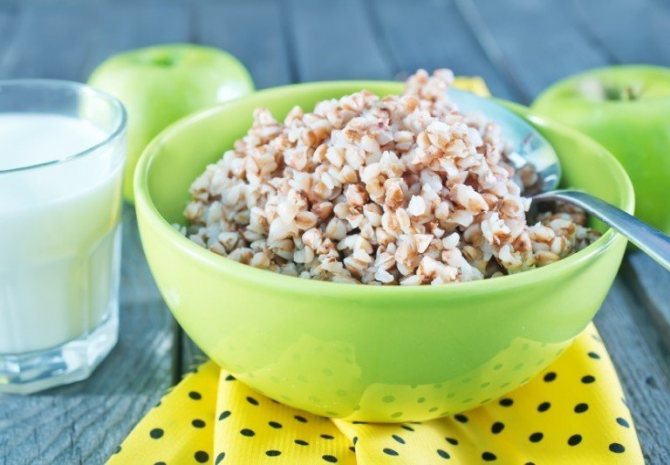
Diet for mom figure
After the birth of a child, a woman’s body changes significantly. The first months are not suitable for actively working on your figure, but properly selected nutrition will help correct it.
To do this, you must adhere to certain rules:
- You need to eat in moderation, without overeating. All food must be balanced and contain the entire list of essential vitamins and minerals;
- You need to eat 5-6 times throughout the day. At the same time, 3 meals should be the main ones, containing the highest energy value, and the remaining ones should be light;
- any product should be administered carefully at intervals of 2 to 5 days. It is recommended to eat a small piece of a new product in the morning, and then monitor the baby’s reaction throughout the day. If there are no negative consequences, then the portion can be increased;
- When the first symptoms of an allergy appear, you should immediately refuse the food you had previously taken. It is best to try again only after 4 weeks;
- For the first time, you need to completely abandon fried foods, replacing them with boiled or stewed food. All vegetables should be steamed;
- all purchased finished products must be replaced with home-prepared ones;
- Your preference should be given to plain water rather than compotes or fruit drinks due to the likelihood of an allergy to the fruits from which they are made.
It is worth remembering that a woman after childbirth should not exhaust herself with diets, as this will only lead to exhaustion of the body, and the child will not be able to receive the required amount of nutrients. At first, any diet should be based on avoiding allergenic foods, preparing a balanced diet, and consuming the right amount of calories.
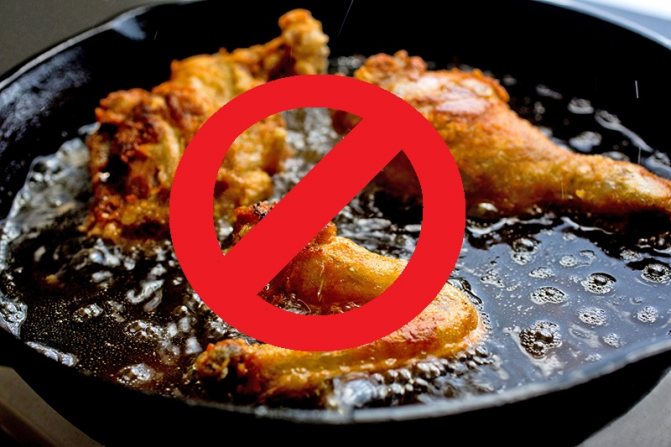
Features of the diet for a nursing mother by month.
The main component of a nursing mother's diet is protein . His breastfeeding mother should consume at least 110 grams daily. Moreover, you need animal and vegetable protein. Protein sources include meat, fish, dairy products, as well as some vegetables, nuts and grains. It is worth noting that consuming the required amount of protein is important primarily not for the child, but for the mother - the baby will still receive the required amount of protein, even to the detriment of the mother.
Magnesium is an important element that promotes better absorption of calcium. Magnesium is found in sunflower and pumpkin seeds, bran and sesame. Calcium is an element on which the formation of the skeleton depends. The main source of calcium is cottage cheese, milk, cheese and other dairy products.
Many newborns are allergic to cow's milk protein, in which case it is necessary to temporarily exclude dairy products and replace cow's milk with goat's milk.
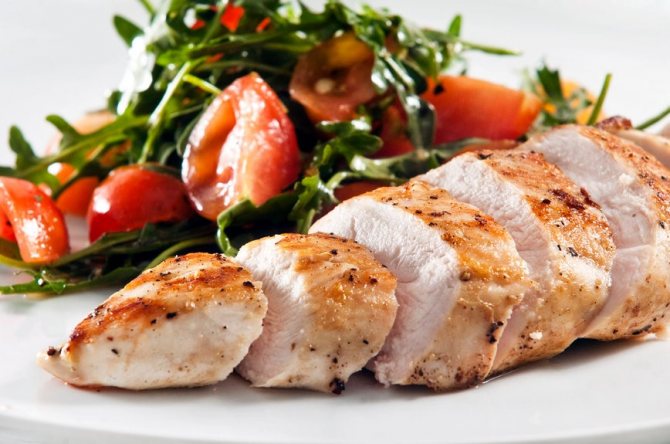
Chicken breast is the main source of protein for a young mother
Nutritional rules for a nursing mother by month
Young women are often concerned about the question of whether it is necessary to follow a strict diet during breastfeeding.
Doctors agree that immediately after birth it is better to stick to a strict diet, and already in the second month you can try introducing new foods.
The diet for a nursing mother should not consist of the same foods over the months. The basis for choosing food for a nursing mother is high quality, safety and variety.
The quality of products is determined not by price, but by composition. When choosing between a yoghurt product and yoghurt, give preference to the second option, or better yet, make yoghurt yourself. The fewer ingredients in a product, the better.
Nutritional rules for mothers during breastfeeding
- Meal frequency is 5 or 6 times a day, of which 3 meals are the main ones. It is advisable to eat 30 minutes before feeding the baby.
- Cooking methods: steam or boiled. Frying, smoking, pickling are prohibited!
- It is advisable to eat at the same time.
- Do not consume processed foods, foods with large amounts of dyes or preservatives.
- Canned food is prohibited.
- It is advisable to avoid exotic foods.
- Priority to dairy products.
- Follow the drinking regime - you need to drink at least one and a half liters of liquid a day - this is clean water, fruit juice or compote. It is the amount of liquid consumed that guarantees a large amount of milk. A large amount of liquid is an additional burden on the kidneys and swelling. It is important to maintain balance.
- Avoid foods that increase fermentation - sweet pastries, carbonated drinks, bananas, apples and other fruits high in sugar.
- Small amounts of fresh fruits and vegetables every day.
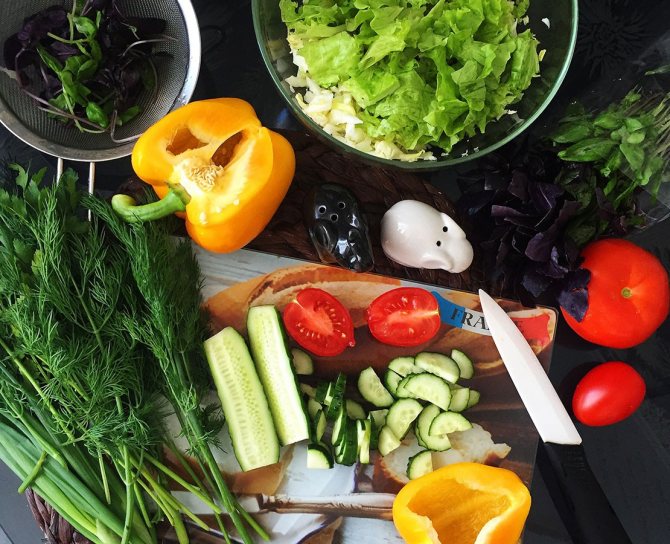
Your diet should include fresh fruits and vegetables every day
A special case
Nutritional adjustments should be made based on the condition of the child and mother. There are many diseases for which it is prohibited to eat certain types of foods.
Childbirth plays a significant role in a woman’s choice of diet. Nutrition should be based on what they were like (natural, caesarean section), whether they resulted in complications. In each case, an individual menu is selected that will contain sufficient products with the necessary set of microelements.
If the child has diseases, the mother’s menu is drawn up after a full examination, only with a specialist. In this case, independently compiling a diet can only do harm.
Recommended fruits
As already mentioned, a woman’s food should not provoke a deficiency of vitamins and other nutrients. Various fruits help you get the necessary components. But in order not to harm the newborn, some of them should be abandoned.
What fruits should you not eat:
- red and orange fruits. The fact is that the substance that colors them can cause an allergic reaction and dermatitis in a child;
- group of citrus fruits. They contain large amounts of vitamin C, which often leads to a strong allergic effect;
- causing excessive gas formation and fermentation in the stomach (grapes, plums, some varieties of pears). They can cause gas and constipation in a newborn, which is extremely undesirable.
You might be interested in: How much milk should newborns eat?

You are allowed to add a small slice of lemon or a slice of orange to your tea. You can include white and yellow cherries, bananas, green apples, persimmons, peaches, and nectarines in the menu. Watermelons, melons, apricots, kiwi, and pineapple will be useful.
If grapes and plums are well tolerated and do not cause gas formation, they can be introduced into the diet very slowly, carefully monitoring the state of the child’s digestion.
Sample menu for a week by day
At first, it’s best not to experiment with food recipes. It is recommended to consume vegetables and fruits only after heat treatment. After strengthening the child’s digestive system, a woman can create a specific menu for the week that she can stick to, for example:
- Monday
- Breakfast – buckwheat boiled in milk, steamed vegetables, fermented baked milk;
- Lunch – vegetarian soup, a piece of boiled fish, dry cookies, weak tea;
- Afternoon snack – cottage cheese with dried fruits, green tea;
- Dinner – boiled potatoes, steamed piece of chicken breast, kefir.
- Tuesday
- Breakfast - wheat porridge with bran bread, kefir, drying;
- Lunch – light fish soup, baked rabbit meat, tea, dried fruits;
- Afternoon snack – fermented baked milk, baked apple;
- Dinner – baked potatoes with beef, dried fruit compote, cottage cheese.
- Wednesday
- Breakfast – a few boiled eggs, steamed broccoli, cheese, tea;
- Lunch – soup with recycled meat broth, stewed chicken cutlet, banana, tea;
- Afternoon snack – light oatmeal cookies, kefir;
- Dinner – lean pork stew, boiled potatoes, baked apple;
- Thursday
- Breakfast – cottage cheese casserole, compote;
- Lunch – stewed vegetable stew with chicken and potatoes, rye bread, tea;
- Afternoon snack – low-fat yogurt;
- Dinner - durum wheat pasta, boiled rabbit meat, low-fat milk.
- Friday
- Breakfast – cottage cheese with dried fruits, grated apple;
- Lunch – chicken baked with vegetables, boiled potatoes, compote;
- Afternoon snack – yogurt, banana;
- Dinner – corn porridge, a small piece of cheese, kefir.
- Saturday
- Breakfast – oven-baked cheesecakes, kefir;
- Lunch – vegetable stew, boiled buckwheat porridge, tea;
- Afternoon snack – baked apple, kefir;
- Dinner – baked fish with zucchini, banana, tea.
- Sunday
- Breakfast - a few boiled eggs, a piece of cheese, dried bread, tea;
- Lunch – fish soup, peeled apple, compote;
- Afternoon snack – oven-baked cheesecakes, tea;
- Dinner - rabbit stew with potatoes, oatmeal cookies, kefir.
Each woman should independently create her own menu, excluding from it those products to which there is a negative reaction. Gradually, the diet should expand with new products.
What a nursing mother can eat in the first month is a controversial issue and largely depends on the child himself, the course of pregnancy, and childbirth. Before eating new foods, you should consult your doctor. It will help you create a menu correctly, especially for the first time, when the baby’s digestive system is still too weak.


